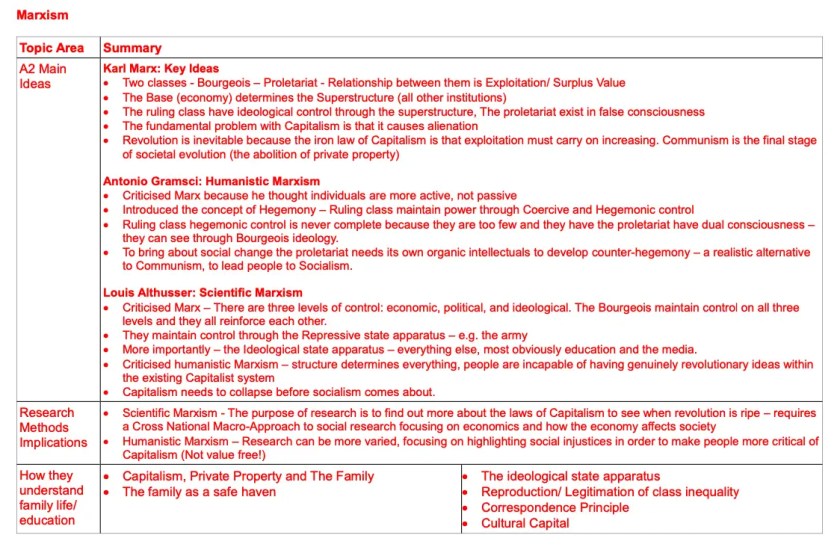Marx argued that human labour was integral to an individual’s sense of identity and the wider culture of a society.
In the Economic and Philosophical Manuscripts Marx argued that it was work, or consciously transforming nature, which distinguished humans from animals, and it was through the creative process of work that man came to recognised himself as human.
For Marx the ideal-state of society was one in which individuals freely organised themselves into groups and collectively engaged in work, intentionally and consciously using their labour power to meet their own physical and aesthetic needs.
In fact for Marx, the origins of culture lie in the capacity of men to collectively organise and consciously produce things, especially those things which are over and above what individuals need to survive.
The material conditions and social relations of a society shape culture to an extent – in Marx’s view there is an ideal state he calls communism which is where there is no private property and under these material conditions man is the most free to use his labour power to express his humanity to its fullest extent.
Under such ‘ideal conditions’ the cultures which emerge are (in my interpretation of Marx) just spontaneous human cultures, as ‘good’ as it gets.
However under the unequal material conditions of class stratified societies, it is the culture of elite class which emerges as the dominant one which in turn becomes a tool to oppress the minority who live in a state of unfreedom and false consciousness.
Alienation and Culture
According to Marx, the ideal-state for humanity is that they live in social conditions which allow them the freedom to fulfil their material needs and aesthetic desires through the creative process of creating things using their imagination.
However, historically the emergence of the concept of Private Property and the accumulation of this property by a few gave rise to Capitalism. Under capitalism a handful of people own and control the means of production which means the majority do not own them which thus means the masses cease to exist in a state of freedom.
Under capitalism the majority lose their freedom to organise their own labour, instead they end up having to work for those who own the means of production, in places such as factories, in order to survive, and they thus lose control over their creative-productive process, and also their very sense of humanity and culture. It was this condition which Marx referred to as Alienation.
So for Marx, the ideal state is that human culture emerges through the individuals freely engaging in productive activities, but the emergence of Private Property and Capitalist inequalities distorts this process, alienating the masses because they are no longer free to organise create their own cultures through their own productive processes.
Culture as Ruling Class Ideology
Marx argued that in class-stratified societies the dominant culture came from the ruling class…..
“The ideas of the ruling class are, in every age, the ruling ideas… the dominant ideas are nothing more than the ideal expression of the dominant material relationships grasped as ideas.”
In Capitalist societies the dominant class was the Bourgeoisie (the owners of the mans of production) and they used their economic power to shape the dominant culture (norms and values) in capitalist society in the 19th century.
We see this especially in Marx’s ideas about the role of religion in society – Christianity in the 19th century was mainly a conservative force which encouraged the poor to know their place in society, respect authority, work hard and seek their rewards in heaven.
Hence Marx saw culture as part of the superstructure of society – with (for example) religious ideas helping to maintain a system of norms and values (a culture) which benefitted existing elites by preventing the spreading of more revolutionary ideas and thus keeping the existing unequal material relations in place.
Some later Marxists such as Adorno applied Marx’s theory to how the mass media works along similar lines in modern societies – with the media effectively keeping the massive passive and stupid and preventing social change.
However even Marx and Engels themselves admitted that the material infrastructure does not entirely determine culture, there is room for some alternative cultures to emerge besides the dominant culture.
Culture as a Reflection of Class Differences
One interpretation of Marx and Engels’ perspective on culture in relation to social class is that different classes will have different cultures, because culture reflects the material conditions in which people live, and there are material differences between social classes.
However Engels himself recognised that aspects of culture could transcend class origins, at least in the sphere of literature where some writers were concerned.
Using the example of Goethe Engles noted that he both celebrated German culture, which reflected his comfortable middle class origins, but he was also clearly disgusted by the wretchedness of his surroundings.
Thus Engels argues that while literature and other forms of art do generally reflect the class origins of those producing them, there is the capacity for individuals to break free of false consciousness and perceive social injustices.
This capacity for individuals and their cultural products to break free of their material conditions is in fact essential for Marx and Engels’ theory of social change to work.
The end point for Marxist Theory is the transition from Capitalism to Communism via revolution, and for that to happen the working classes need to break free from their chains, and to do that they have to break free of false consciousness and be able to see ruling class ideology as false.
Signposting and related posts
This material in this post is relevant to the Culture and Identity module, usually taught as part of the first year of study for AQA’s sociology specification.
Please click here to return to the homepage – ReviseSociology.com













